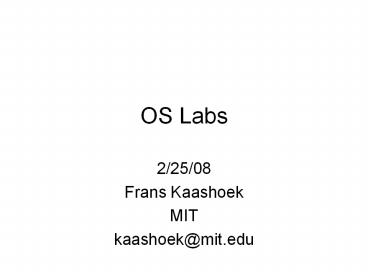OS Labs - PowerPoint PPT Presentation
Title:
OS Labs
Description:
Clean simple abstractions, easily understandable in isolation ... Security. Multicore. Finding errors in OSes. Some Wednesdays; see schedule. Have fun! ... – PowerPoint PPT presentation
Number of Views:55
Avg rating:3.0/5.0
Title: OS Labs
1
OS Labs
- 2/25/08
- Frans Kaashoek
- MIT
- kaashoek_at_mit.edu
2
New labs for Tsinghua OS course
- Operating systems can be misleadingly simple
- Clean simple abstractions, easily understandable
in isolation - Complexity is in how their implementations
interact - Learn by doing, focus on interactions
- How do hardware interrupts interact with kernel
and user-level processes? - How to use virtual memory to solve many problems?
- Labs build a complete OS from the ground up
3
Why might you care?
- Perhaps you will build an OS
- Perhaps you will design hardware
- Or write a device driver, network stack, or a
file system - Or need to diagnose application bugs or
performance - Or you just want to know how computers work
- Or you just want to have fun programming
4
Lab OS JOS
- Labs based on MITs OS class (6.828)
sh
ls
fork
LibOS w. Unix API
LibOS w. Unix API
exofork
Small kernel with low-level API
- JOS has an exokernel/hypervisor structure
- Different than Linuxs organization
- Forces you to see something else and think
5
The labs bottom up
- Booting
- Memory management
- User-level environments
- Preemptive multitasking
- File system and spawn
- A shell
required
optional
6
Development environment
- Tools gcc, make, etc.
- Target hardware platform x86 PC
- For debugging bochs and qemu
- Lab assigments come with tests
- Details at course web pages
7
sh shell
- Interactive command interpreter
- Interface (the shell) to the operating system
- Examples of shell commands
- ls create process
- ls gt tmp1 write output to file
- sh lt script gt tmp1 run sh script
- sort tmp uniq wc process communicate
with pipe - compute-pi run program in background
- .
OS ideas isolation, concurrency, communication,
synchronization
8
shell implementation
- while (1)
- printf()
- readcommand(command, args)
- pid fork() // new process
concurrency - if (pid 0) // child?
- exec (command, args, 0) // run command
- else if (pid gt 0) // parent?
- r wait (0) // wait until child is done
- else
- perror(Failed to fork\n)
9
Input/Output (I/O)
- I/O through file descriptors
- File descriptor may be for a file, terminal,
- Example calls
- read(fd, buf, sizeof(buf))
- write(fd, buf, sizeof(buf))
- Convention
- 0 input
- 1 output
- 2 error
- Child inherits open file descriptors from parents
10
I/O redirection
- Example ls gt tmp1
- Modify sh to insert before exec
- close(1) // release fd 1
- fd create(tmp1, 0666) // fd will be 1
- No modifications to ls!
- ls could be writing to file, terminal, etc.,
but programmer of ls doesnt need to know
11
Pipe one-way communication
- int fdarray2
- char buf512
- int n
- pipe(fdarray) // returns 2 fds
- write(fdarray1, hello, 5)
- read(fdarray0, buf, sizeof(buf))
- buf contains h, e, l, l, o
12
Pipe between parent child
- int fdarray2
- char buf512
- int n, pid
- pipe(fdarray)
- pid fork()
- if(pid gt 0)
- write(fdarray1, "hello", 5)
- else
- n read(fdarray0, buf, sizeof(buf))
- Synchronization between parent and child
- read blocks until there is data
- How does the shell implement a b?
13
Implementing shell pipelines
- int fdarray2
- if (pipe(fdarray) lt 0) panic ("error")
- if ((pid fork ()) 0) // child (left end
of pipe) - close (1)
- tmp dup (fdarray1) // fdarray1 is the
write end, tmp will be 1 - close (fdarray0) // close read end
- close (fdarray1) // close fdarray1
- exec (command1, args1, 0)
- else if (pid gt 0) // parent (right end
of pipe) - close (0)
- tmp dup (fdarray0) // fdarray0 is the
read end, tmp will be 0 - close (fdarray0)
- close (fdarray1) // close write end
- exec (command2, args2, 0)
- else
- printf ("Unable to fork\n")
14
OS abstractions and ideas
- Processes (fork exec wait)
- Files (open, create, read, write, close)
- File descriptor (dup, ..)
- Communication (pipe)
- Also a number of OS ideas
- Isolation between processes
- Concurrency
- Coordination/Synchronization
- Your job implement abstractions and understand
ideas
15
What will you know at the end?
- Understand OS abstractions in detail
- Intel x86
- The PC platform
- The C programming language
- Unix abstractions
- Experience with building system software
- Handle complexity, concurrency, etc.
16
Lab lectures
- Monday 3/3
- Intel x86 introduction, assembly, stack
- Helps with lab 1
- Monday 3/17
- Intel x86 memory management interrupts
- Helps with lab 2 3
17
Bonus lectures special topics
- OS architecture
- Virtual machines
- File systems
- Security
- Multicore
- Finding errors in OSes
- Some Wednesdays see schedule
18
Have fun!































